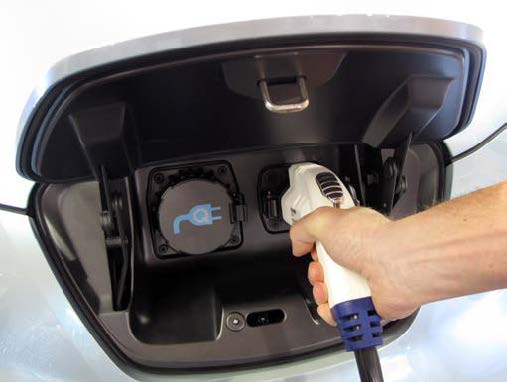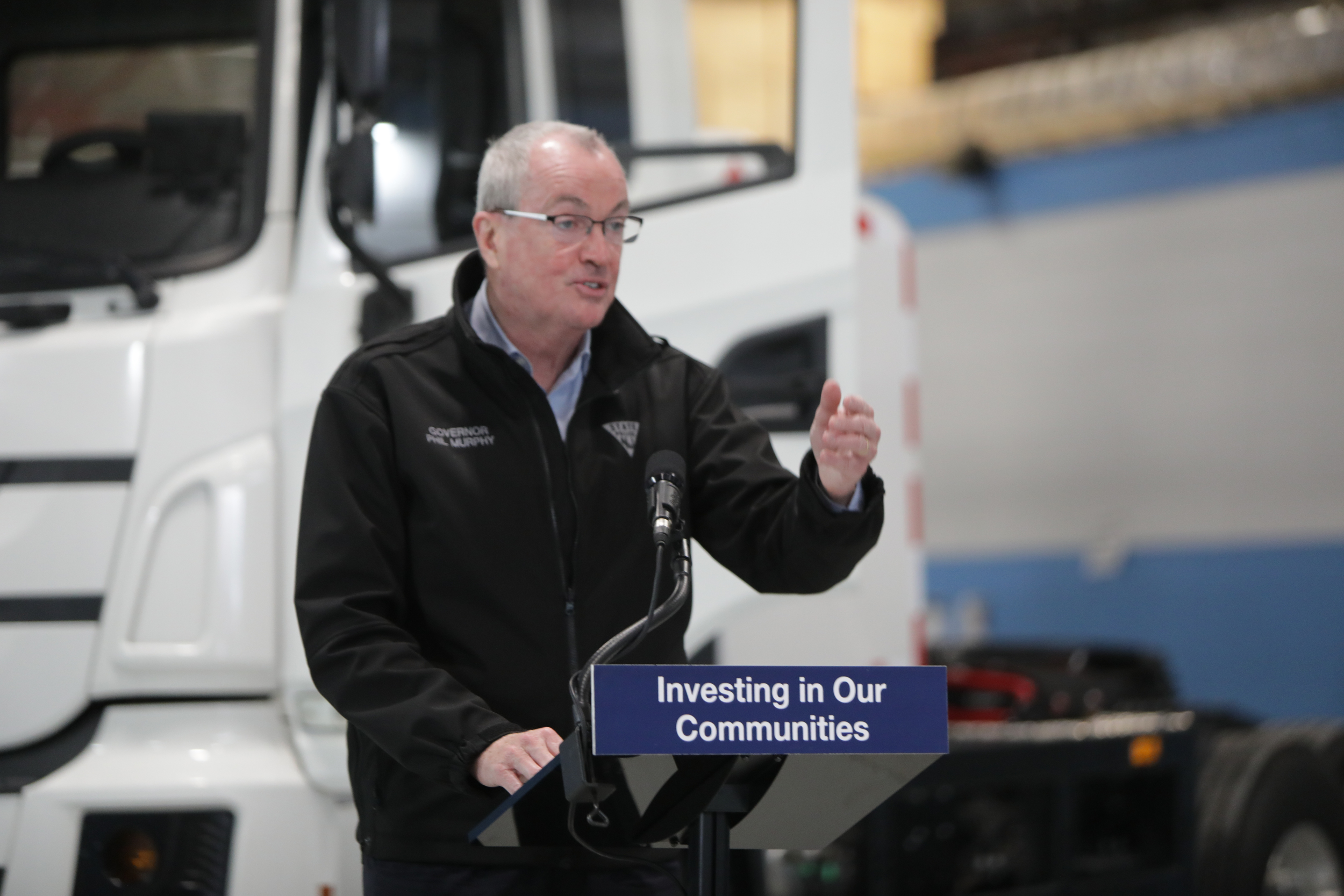MURPHY ADMINISTRATION RELEASES ITS SECOND RGGI STRATEGIC FUNDING PLAN CONTINUING INVESTMENTS IN CLIMATE CHANGE REDUCTION, ENVIRONMENTAL JUSTICE AND CLEAN ENERGY THROUGH 2025

FOR IMMEDIATE RELEASE
July 21, 2023
Contact: Caryn Shinske (DEP) (609) 984-1795
Virginia Pellerin (EDA) (609) 858-6915
Peter Peretzman (BPU) (609) 900-5626
MURPHY ADMINISTRATION RELEASES ITS SECOND RGGI STRATEGIC FUNDING PLAN CONTINUING INVESTMENTS IN CLIMATE CHANGE REDUCTION, ENVIRONMENTAL JUSTICE AND CLEAN ENERGY THROUGH 2025
DEP TO ANNOUNCE COMPETITIVE SOLICITATION FOR ELECTRIC TRUCKS IN CONJUNCTION WITH RELEASE OF PLAN
The second RGGI Strategic Funding Plan: Years 2023 through 2025 expands on the first iteration of the plan, as well as introduces new investments while prioritizing projects that will benefit New Jersey’s environmental justice communities.
“RGGI auction proceeds help fund investments in climate mitigation to grow New Jersey’s green economy while protecting residents, businesses and institutions,” Environmental Protection Commissioner Shawn M. LaTourette said. “This strategic funding initiative is critical to the mission of ensuring that our most vulnerable communities benefit from projects that will provide environmental justice for decades of pollution impacting public health and quality of life.”
The first RGGI Strategic Funding Plan was released in April 2020 and provided a framework for how the State would invest its proceeds through 2022 after Governor Murphy re-entered New Jersey into the RGGI partnership in 2019. New Jersey’s renewed participation in RGGI, the cap-and-trade pact among 11 northeastern states dedicated to reducing greenhouse gas emissions from the electricity-generating sector, supports the state’s 2030 and 2050 climate and clean energy goals.
The Strategic Funding Plan is reviewed every three years and updated to ensure that investments are aligned across agencies to meet the Murphy Administration’s clean energy and greenhouse gas reduction goals.
Since the first plan’s release, RGGI proceeds have funded the launch of several projects such as the NJ Zero Emissions Incentive Program (NJZIP), various DEP electrification projects and the Natural Climate Solutions Grants Program.
“The RGGI Strategic Funding Plan is key to reducing carbon emissions and improving the quality of life, particularly in overburdened communities,” said NJBPU President Joseph L. Fiordaliso. “The RGGI proceeds will fund important programs to combat and reduce the devastating impact of climate change as we continue to work to amplify and reach Governor Murphy’s goal of 100 percent clean energy by 2035.”
“Using RGGI funds to address climate change and prioritize environmental justice will not only mitigate harmful environmental impacts but will also drive economic growth and boost our green economy,” said New Jersey Economic Development Authority Chief Executive Officer Tim Sullivan. “Through programs like NJZIP, the NJEDA is working to reduce pollution and enhance the health of all New Jerseyans, while meeting Governor Murphy’s call to create a more inclusive, equitable economy.”
The 2023-2025 Strategic Funding Plan identifies four initiatives for funding:
- Accelerate healthy homes and building decarbonization: Funding will accelerate the pace of decarbonization of buildings in the State by investing in projects and programs that promote building decarbonization and reduce energy consumption, energy burden and overall emissions from the building sector, including programs that promote workforce readiness to build, install, repair, and maintain the technologies critical to meeting these goals. This initiative will also support the replacement, repair and retrofit of refrigerants in chillers and refrigeration systems, to phase out the use of highly warming refrigerants.
- Catalyze clean, equitable transportation: Continuing the success of the same initiative in the previous Strategic Funding Plan, the agencies will continue to drive the transition to electric transportation throughout the state, with a focus on electrifying light, medium and heavy-duty vehicles particularly in environmental justice communities. The agencies will also use funding to grow New Jersey’s electric vehicle charging infrastructure.
- Strengthen New Jersey’s forests: Funding will be dedicated to protecting and enhancing the State’s public and private-owned forests to ensure their continued role in sequestering carbon.
- Promote blue carbon in coastal habitats: Funding will be dedicated toward protecting and enhancing the State’s public and private-owned tidal marshes to ensure their continued role in sequestering carbon.
These initiative areas reflect the mandates of the Global Warming Solutions Act, and extensive feedback collected during the public outreach process. Feedback was collected in June 2022 through a webinar and a 30-day comment period where the public prioritized their climate solutions using an innovative voting platform. The secondary phase of outreach was collected following the April 2023 release of a scoping document that allowed the public to provide meaningful input on the scoping document’s potential initiatives. The State received valuable input from diverse stakeholders including municipalities, unions, environmental groups, environmental justice advocates, transportation planners, the energy sector and resource conservation groups.
View the second RGGI Strategic Funding Plan: Years 2023 through 2025 at www.nj.gov/rggi/docs/rggi-strategic-funding-plan.pdf
To learn more about RGGI, visit www.rggi.org/
For information about RGGI strategic investments in New Jersey, visit https://nj.gov/rggi/
For more information on New Jersey’s vehicle electrification goals and strategies, visit www.drivegreen.nj.gov
For updates from NJBPU on RGGI-funded programs, visit
www.nj.gov/bpu/about/contact/subscribe.html
Follow the DEP on Twitter @NewJerseyDEP
Follow the BPU on Twitter @NJBPU or visit https://www.nj.gov/bpu/
Follow the NJEDA on Twitter @NewJerseyEDA or visit https://www.njeda.gov/
Follow DEP Commissioner LaTourette on Twitter and Instagram @shawnlatur and follow the DEP on Twitter @NewJerseyDEP, Facebook @newjerseydep, Instagram @nj.dep, and LinkedIn @newjerseydep




